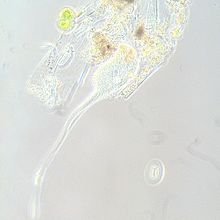Lacrymaria olor is a species of ciliates, typically 100 micrometres (0.10 mm) long, that is found in freshwater ponds. Its name means "swan tear" in Latin, and refers to its general shape: namely, a teardrop-shaped cell with a small "head" at the end of a long slender "neck". The classification has been attributed to Müller (1786).[1]
| Lacrymaria olor | |
|---|---|

| |
| Scientific classification | |
| Domain: | |
| (unranked): | |
| Phylum: | |
| Class: | |
| Family: | |
| Genus: | |
| Species: | L. olor
|
| Binomial name | |
| Lacrymaria olor (O. F. Müller, 1786)
| |
| Synonyms | |
|
Vibrio olor O. F. Müller, 1786 | |
The protist is notable for its ability to extend its "neck" by up to thirty times the length of its body (about 1.2 mm), and manipulate in many directions very rapidly — even around obstacles — in order to capture its food.[2][3] Such extension is not in and of itself unique, but the organism's ability to do the extension quickly and repeatedly sets it apart from others.[3] The molecular mechanism underlying L. olor's "cellular origami" appears to be a helical array of microtubules, presently unique among organisms, uncovered in 2024.[3][4]
The protist usually has two macronuclei and a single micronucleus. Its entire cell body is covered with cilia arranged in spirals. It has two contractile vacuoles, one at each end of the body. It contains small birefringent crystals.[2]
Lacrymaria olor can be easily reproduced in vitro, but cultivated populations are difficult to maintain for long. It can reproduce sexually, with each individual assuming either of two mating types ("sexes") at various times of the day. It can also reproduce asexually, possibly after an internal rearrangement of its genome; but there is evidence that this mechanism stops working after a certain number of consecutive asexual generations.[2] It can also regenerate a new head within minutes, if the original is cut off.[2]
Lacrymaria feed primarily on smaller organisms such as other ciliates, flagellates, and amoeba, but may sometimes tear chunks out of larger ciliates.[2]
Gallery
editSee also
editReferences
edit- ^ Ward, Henry Baldwin; Whipple, George Chandler (1918). Fresh-Water Biology (1st ed.). London: John Wiley & Sons. p. 274 – via Internet Archive.
- ^ a b c d e Winsby, Roy, ed. (February 1998). "'Tears of a swan'". Micscape. No. 28. Original article by Richard L. Howey, video provided by Ken Jones. ISSN 1365-070X. Retrieved 4 August 2024.
- ^ a b c de Jesús, Erin Garcia (27 July 2024). "How a protist stretches its neck really, really far". Science News. Vol. 206, no. 1. p. 4.
- ^ "The first example of cellular origami". Stanford Report. Stanford University. 6 June 2024. Retrieved 4 August 2024.
- Lacrymaria olor page at the Encyclopedia of Life. Accessed on 2009-12-04.